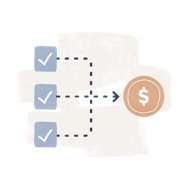No matter how smart you are or how great your product may be, your business needs one very important ingredient if it’s going to thrive — the right equipment. The right equipment can help optimize performance and take your business to the next level, but it might be out of reach.
Thankfully, an equipment lease may be able to help you get the specialized machinery or technology your company needs now, even if you don’t have all the money you need to pay for ownership of the equipment up front or you’re not interested in equipment loans.
With an equipment lease, you get the right to use the equipment while you’re making monthly payments to a leasing company or financial institution.
What is an Equipment Lease?
Essentially, equipment leasing can be viewed as an alternative form of small business financing — most notably equipment loans. It’s a way to help you get what your business needs now with less money out of your pocket on the front end. However, you’ll generally need a decent personal credit score to qualify for the most attractive rates and terms.
Equipment leasing involves a contract between a lessor (that’s the company you’ll pay) and a lessee (that’s you). The lessor buys the equipment outright from the manufacturer. As the lessee you’re allowed to use said equipment for a period of time, provided you hold up your end of the bargain and make your agreed upon monthly payments on time to the lessor.
Of course every lease is different, but it’s not unusual to find companies willing to offer two to five year leases with interest rates anywhere in the 8.5% to the 20% range. Your exact rate and terms will vary depending upon your credit, the type of equipment you’re seeking to lease, and even your business’ industry itself.
Some types of equipment you might be able to secure with business equipment leases include:
- Computers
- Printers
- Vehicles
- Furniture
- Heavy Equipment
- Medical Equipment
- Specialized Equipment
- Restaurant Equipment
How Equipment Leasing Can Improve Cash Flow for Your Business
When you need a new, expensive piece of equipment, buying it outright can put a serious strain on your business’ cash flow. Using a large portion of your available working capital means that you will no longer have access to that money when other expenses arise, as they inevitably do in any business.
However, you can preserve your company cash flow by using a lease to secure the equipment instead. Equipment leasing solutions can help you both preserve cash flow and grow your business.
Remember, good cash flow can often be the difference between business success and business failure. It sounds dramatic, but it’s true. Many businesses have experienced disaster due to cash flow challenges they failed to overcome.
Anything you can do to affordably increase your company’s cash flow may be a good idea. At the very least, if it improves cash flow and helps your balance sheet, it’s worth some serious consideration.
Equipment Leasing Business Model
Equipment leasing is actually very popular among U.S. businesses. The Corporate Finance Institute, a leading global provider of financial courses and certification programs, reports that more than 80% of U.S. businesses lease at least some equipment rather than buying it outright.
With so many companies in need of equipment leasing options, it’s no surprise that there are many of companies lining up to provide leasing options. In fact, the world of equipment leasing is quite competitive. (See below for specific examples.)
At this point, you may be wondering how equipment leasing companies make money. There’s actually not just one simple answer to that question. Instead, there are a number of ways for money to be made through an equipment leasing business model, including:
- Finance Charges — A leasing company might, for example, purchase a piece of equipment at 9% APR but lease it to you at 12%.
- Equipment Owner Tax Benefits — Since the equipment leasing company actually maintains ownership of the equipment, it often gets to take advantage of any ownership-specific tax benefits such as depreciation.
- Prepayment Penalties — A leasing company might offer you the right to get out of your contract early, but at a cost.
- Excess Use Charges — Your equipment you lease will likely have usage restrictions. If you return the equipment in poor condition or with excess mileage, you might have to pay a penalty.
Equipment Leasing Definitions
If you’re considering leasing equipment for your company, it’s a good idea to understand several important definitions, along with the specific payment terms and fees that may be part of your leasing agreement.
Capital Equipment
Technology or machinery that you need to operate your business that costs near or above $5,000 is often referred to as “capital equipment” in the equipment leasing world.
This is the type of equipment most commonly leased in the U.S., both to preserve cash flow and to avoid paying outright for equipment that’s likely to be obsolete within a few years.
Capital Lease
When you sign up for a capital lease, you typically have the option to buy the equipment at the end of the lease term — sometimes for as low as $1.00. Capital leases generally feature longer payback terms (aka you pay over a longer period of time) and can’t be canceled early.
You may also responsible for making repairs, paying insurance and tax on the equipment. Your monthly lease payments may also be higher with this option.
True Lease
With a true lease you typically have the option to return the equipment at the end of your lease period. However, you can also opt to purchase it or roll it over into the lease of newer equipment.
Skip Lease
A skip lease can be a good fit for businesses that are more profitable during certain seasons. During certain months, larger payments will be due. However, you can set up your payment structure so that during other, traditionally slower months, you may be able to skip payments altogether.
Sale Leaseback
Do you own a piece of equipment outright? If so, you might be able to sell it to an equipment leasing company for a lump sum payment to help you with immediate working capital needs. However, you could turn around and lease the equipment back from the lessor so that your business can retain continue to use the machinery.
Monthly Payment Terms
Your lease agreement (aka contract) will lay out the terms that you have to follow to maintain the right to use the equipment. Among these terms with be financial terms — aka how much you have to pay each month and when those payments are due.
If you miss a due date, you may be charged a late fee and, if you fall far enough behind on your payments, the equipment might be repossessed.
Equipment Leasing and Finance Association
If you’re searching for affordable lease options for your company, you’ll probably come across one organization a few times during your Google search — the Equipment Leasing and Finance Foundation. ELFF is a non-profit organization that encourages thoughtful innovation and just the general betterment of the equipment financing and leasing industry.
Credit Score Requirements
Just like with equipment loans, to qualify for an equipment lease you’ll need to satisfy the credit score requirements set forth by a lender or equipment leasing company. In general, a higher personal credit score leads to lower rates and smaller monthly payments on your equipment lease.
In general, there are four different credit tiers that could impact your chances of approval and the cost of your lease, if your credit is strong enough to qualify.
| Financing Tier | Credit Score Required |
| A Tier | Over 700 FICO Score |
| B Tier | 680 to 700 FICO Score |
| C Tier | 620 to 680 FICO Score |
| D Tier | 520 to 630 FICO Score |
Just remember, every financial institution (like a bank or credit union), online lenders, and leasing companies have their own set of approval and pricing criteria. The tiers above can be used as a basic guideline, but they may not match exactly to the requirements you encounter with a specific bank or equipment leasing company.
Be sure to check the requirements for the institution before filling out a credit application form.
Top 50 Equipment Leasing Companies
The Monitor Daily dubs itself “the independent voice of equipment finance.” Every year, the Monitor publishes several reports pertaining to the equipment financing and leasing industry in the United States. Among these reports is one entitled the Monitor Bank 50.
The Monitor Bank 50 report ranks the top “bank-affiliated equipment leasing and finance companies in the U.S.” If you want to see a recent copy of the report, the Monitor Daily will require you to purchase it. However, you can view the 2016 version here.
The report measures the performance of these banks over the past 12 months, including their net asset size, new business activity, and market share. It also forecasts how the banks may continue to perform in the years to come. What the report cannot tell you; however, is whether any of these banks may offer the right equipment leasing option for you.
Equipment Leasing Companies
If you’re considering an equipment lease over equipment financing, you’ll need to do your homework and research who offers the best deal based on your situation.
Here’s a list of a few equipment leasing companies you might want to review:
Equipment Leasing Calculator
It’s also smart to try to calculate the full cost that a leasing or financing company might charge you to spread out your payments when you’re comparing equipment leasing options — or any other types of equipment leases or financing possibilities for that matter.
Be sure to calculate not just the interest rate you’re being charged, but also any additional fees (e.g. origination fees, etc.).
These business loan calculators from Nav may help to give you a better picture of what you’ll be expected to pay overall for an equipment lease.
Heavy Equipment Leasing Companies
If you need to lease heavy equipment for your company, here are a few companies that specialize in this type of lease:
Be sure to do your research and compare any offers from these companies with other equipment lease offers that may be available. Nav’s business loan calculators may be helpful with the leasing process.
Equipment Leasing Companies for Bad Credit
As mentioned, the better the condition of your credit, the easier and more affordable it will typically be to lease equipment for your company. If you try to qualify for an equipment lease when you have a poor credit rating, your options are likely to be very limited.
Keep in mind that even if you can technically qualify for a lease, a leasing company or lender may want you to satisfy certain other requirements as a tradeoff for having less-than-stellar credit.
With bad credit you might face any of the following consequences:
- Higher Down Payment
- Cosigner Requirement
- Additional Collateral Requirement
- Higher Interest Rate
If you currently have credit problems, your best bet is to work on improving your credit rating as quickly as possible so that you won’t face approval problems or less attractive terms in the future. Remember, for all small business owners, strong personal credit scores can be a very valuable asset.
This article was originally written on June 20, 2019 and updated on October 16, 2019.



Thanks for sharing the information this will really helpful for me